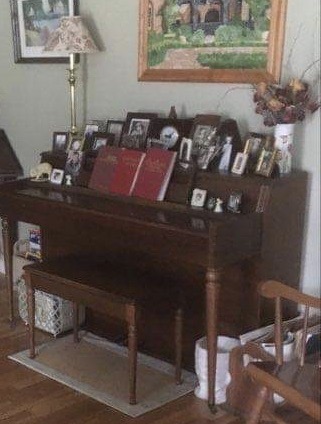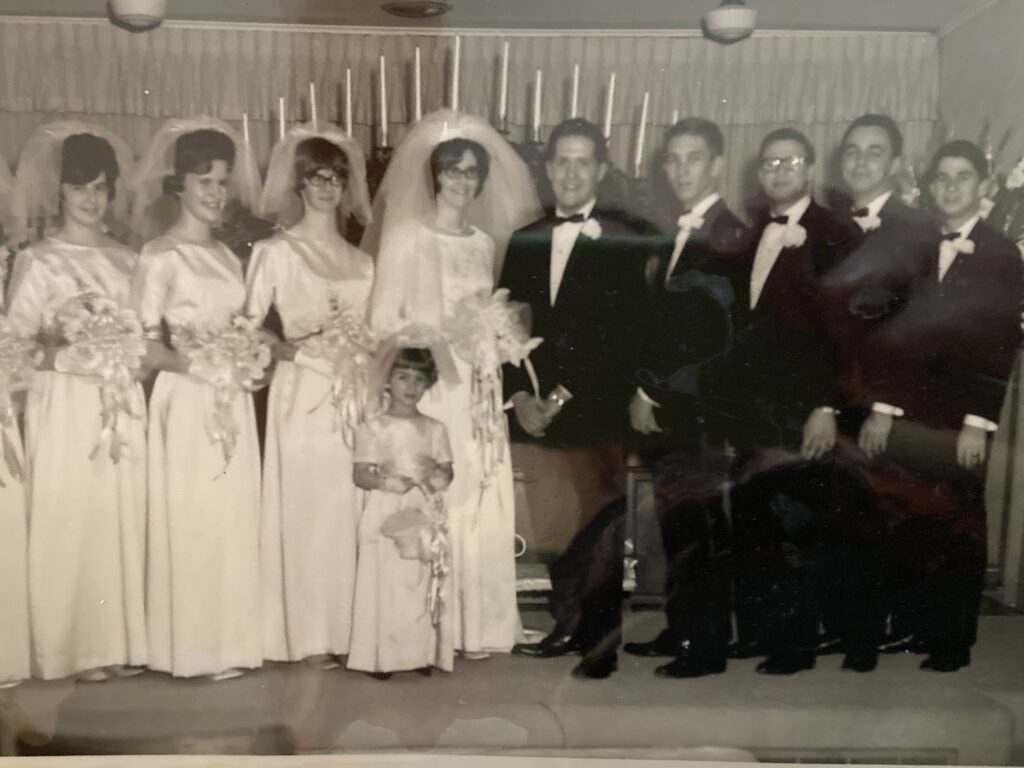
The Change of Space
Returning home presented an entirely new set of challenges for Richard, Kelley, and Paulette. Rooms that were designed and prepared to entertain by Paulette would now sit mostly empty and devoid of the many people she hoped would fill them up with joy and laughter. Where once there might have been warm lamplight and vibrant music, only a dusty gray light filled each corner. The piano lid would never again be raised to feel the touch of Paulette’s delicate fingers caressing its keys underneath.
Still, the house opened itself up in other ways. The master bedroom with a lovely rear facing window overlooked the back yard where birds would frequent and sunlight could stream in. A traditional bed was removed to make way for a hospital bed for Paulette, a recliner for Richard. There, the two could look out into the fenced-in back yard without claustrophobia. This space would provide relief from the mundaneness of daily routines of Paulette’s care. When and if guests dropped by, the room felt less like a ward and offered distractions for the eyes that might feel uncomfortable seeing her in an invalid condition.
Kelley moved into the hall room and quit her job to assist with her mother’s care while Richard took a new job in palliative care with a local hospice organization, but over time exhaustion conquered any life, he knew outside of nursing his wife.
New Perspective
Some therapies continued for a while, but battles over insurance prevailed. Expenses mounted, and the family prayed, and prayers were answered with a wheelchair accessible van, special meals for Paulette, and her good health. She never returned to the hospital again. Eventually, the family found a physician who would make house calls.
No family should be asked to endure what Richard and his family endured, and many would have found themselves in anger at God for ruining their life. Not Richard. In the wake of the disarray that his life had become, Richard began to develop a new perspective on his life and on his ministry if not his faith in God. One might ask, how he felt about his wife after all of this occurred. The expression of that love now reformed into a brilliant awareness of his new place in their marriage. But perhaps it is best to let Richard speak for himself.
“The greatest thing that ever happened to me was Jesus Christ, but she is the greatest thing that ever happened to me besides Jesus Christ, and he gave her to me because he knew I needed her. She’s not a burden to bear. She’s a crown to wear. She’s a treasure. She was God’s gift to me in the ministry. If my ministry was anything, it was because of her and what God had done in her as well as what she taught me. She taught me how to love unconditionally.
People would reject [me], and she would just say, ‘We have to love them. We have to forgive them.’ She taught me how to love, and my love has grown richer, deeper. I don’t know anything but that now.”
Within 2 years after Paulette came home, Kelley would meet her own love, Chuck, after 39 years of caring for her friends, her church, her nieces, and her mother and father. The void would soon be filled by Paulette’s current live-in nurse, Jennie, a loving and dedicated caregiver that has been with them for 12 years.
Her Ministry
Paulette cannot love Richard with arms extended. She cannot play the piano for him or sing. Her beautiful voice has never been heard, not a word uttered in 15 years. Yet Richard believes her love for him is stronger than ever.
Even in her convalescence, Richard says, “I get to share in this with her.” She, through her ministry, is still taking care of him. “I’m still getting more out of her than she’s getting from me. I’m still receiving more than I’m giving. She’s still way ahead of me in loving. I could never be the husband that she’s been a wife.”
Redefining Love
Visitors are few and far between now. The daily routine falters little and is by no means glamorous. Still, Richard does not view what might be a chore or burden as such. He sees it as his way to reciprocate the love to Paulette at last.
What makes a timeless love story? When in this world we find it so much easier to run from love, to close off to it, to fear it, to abuse it, what defines what love is and can hope to be any more? For Richard, love would not be defined by any of the more traditional romanticized aspects that we associate love with. He saw love as the spirit of God in their ministry shared together as a family, and God providing for his family with the love of his congregation.

Hollywood never corrupted Paulette’s love for Richard with fantasy ideals. She didn’t characterize her love, dedication, and commitment to him as a sacrifice and she never evaluated herself against any feminist ideal that she was submissive or that her wants and needs were not met. She proudly stood alongside her husband in the calling God planted on Richard at age 12, raising her daughter, and caring for the members of the churches she served in. Their love, though not traditional or even poetic Richard defines like this…
“Let me just say this about love. In this age where we are taught to love ourselves and take care of ourselves and do good for our selves… Paulette is self-less not selfish. Paulette always puts others ahead of herself. Paulette’s joy in life is to see others better than her. She does that even now.
Love is not measuring what the other one does. Love is saying, ‘God, you love me this much, and you’ve told me to love others as you love me, and so how much is that?”
The Final Commitment
Richard’s third commitment to God? To love Paulette as much as God loved him for giving him his beautiful wife in the first place.
The preacher’s wife went beyond the marriage commitment and loved more deeply than she was ever asked to do, and that is a timeless love that Richard shares with her today. That is the love that she is teaching him still now by giving him the chance to take care of her, using their love as a ministry to others on what a timeless love really can be.
“She still loves me more than I love her if that’s possible.”
I ask, “How do you know?”
“Because even now, the way she looks at me, responds to me, the way she tries to help me when I’m trying to do something for her knowing that she can’t.” He goes on to speak to how her situation impacts his ministry in miraculous ways even now. He refers to it as her ministry saying, “She’s touched lives in this way.”
Paulette was happy to love, support, and be framed in the home and ministry created for her. It was never a sacrifice or a compromise. It was love, love that Richard never felt worthy of. And how does he love her now, after 53 years of marriage? With words, gentle words, touches, affection, saving his best for her, he often sings to her a song he wrote just for her.
What he wants the world to see is not an aging woman debilitated by her injuries. He wants the world to see her as only he truly can.



